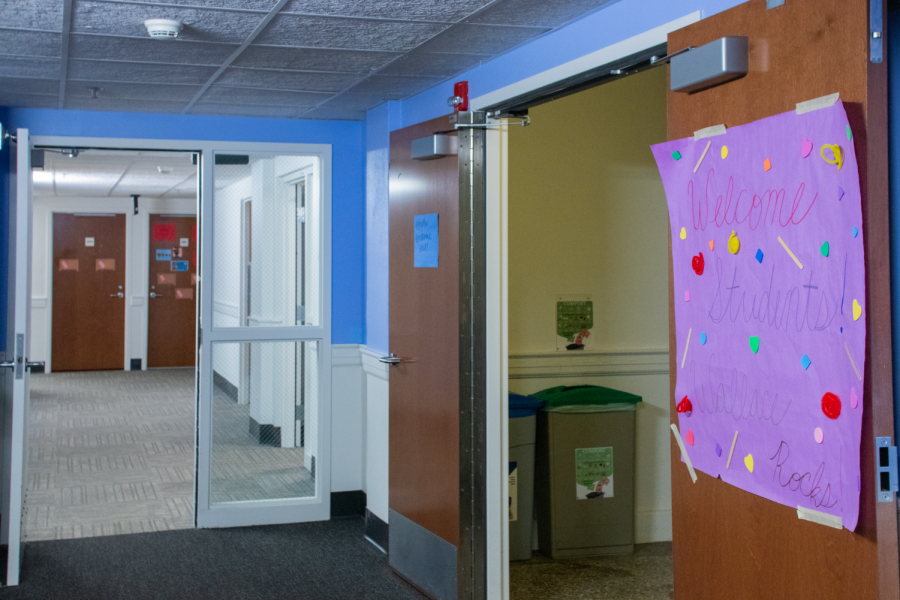Macalester RAs ask for full room and board compensation
September 16, 2021
When Laurel O’Hare ’23 started considering her job options for her sophomore year at Macalester, the Resident Assistant (RA) position looked particularly good. She liked the idea of helping build a community with a group of dorm residents — plus she knew that the pay was high.
O’Hare assumed that both room and board were covered in the RA payment. It took until the school year had almost started for her to realize that only room was taken off her bill — not board, which is the cost of the meal plan.
“I don’t even think I found out until I looked at my statement for the fall of 2021 and realized that only room was being compensated,” O’Hare said.
O’Hare is part of a group of RAs who want to change that. The group plans to put together a petition and presentation to ask the school to compensate board as well as room.
Several RAs in their first year on the job made the same oversight as O’Hare. The RA job description specifies that RAs are “compensated for housing” — the $7272 room charge is taken off of RAs’ bills. But the job description doesn’t mention the $6270 annual board cost, which some assumed was also covered.
“They’re not as transparent as I feel like they should be,” O’Hare said.
Katie Funk ’23, who is in her second year as an RA, started putting this effort together during RA training in August. So far, the group has researched other schools’ RA payment methods and talked to their residence hall directors (RHDs) and the Office of Student Employment about the issue to get more information.
Interim Director of Residential Life Marian Aden noted that RAs are the highest paid student employees on campus.
“They hold a great leadership position, they do a great service for students and for their peers,” Aden said. “They have the compensation of room because they are required to live on campus. Part of their job requirement is to live and be present, and if we’re asking somebody to live in a certain place, then we are going to provide them with coverage.”
The RAs in this group say that their work is worth the extra compensation of board, in addition to room. One reason for this is the amount of dedication that the job requires. The RA job description puts the position at 15 hours a week, but, in reality, that time commitment varies from week to week and from RA to RA. Some weeks have more meetings and one-on-ones with residents than others; some RAs oversee more than 50 residents, while some have closer to 30.
Technically, RAs are only scheduled for meetings and on-call hours that average about 15 hours a week. But RA Korayma Llumiquinga Lapham ’24 noted that by the nature of the job — being responsible for a community of students — RAs end up working outside of those scheduled hours.
“Being an RA is not a full time job, it’s a 24/7 job,” they said. “If a resident comes up to me and says, ‘Hey, I need help with this,’ or ‘I have a friend that’s in danger,’ I’m not going to say, ‘No, sorry, I’m not on call tonight.’ We need to be fairly compensated for that.”
According to Aden, Residential Life and the Office of Student Employment review RA payment every year. RA compensation was last altered a few years ago — in spring 2020, the school started allowing RAs to earn up to $1500 a year working at an additional on-campus job, which equates to about five hours a week.
At that point, the school concluded that room plus the additional on-campus job option was a fair compensation package that was comparable to what other schools paid their RAs. Returning RAs are also given a stipend of $500 for junior RAs and $750 for seniors.
But getting an on-campus job can be difficult for RAs. Since RAs already have jobs, students who have student employment awards and no job yet are considered before them in the hiring process. Some campus jobs also look for students who can work more than five hours per week.
Since Macalester compensates RAs by removing the room cost from their tuition bills, they don’t have the option to get a paycheck for their RA work, like most student employees do.
“That pushes a lot of RAs to find off-campus jobs, because we need spending money that the school just doesn’t give us,” Funk said.
Llumiquinga Lapham was able to keep working five hours a week at their campus job from last year. They said that working off campus would earn them more money, but between their RA hours, classes and transportation, that wouldn’t be feasible for them.
Funk noted that there are equity issues in how the RA work and pay is distributed. Some RAs with more residents end up having more work than others, though their pay is the same and they are all allowed to work the same number of hours at additional on-campus jobs. A few RAs are assigned to dorms that include kitchens, so they aren’t required to pay for the meal plan. Whether you get one of those dorms or not is up to the luck of the draw, Funk said.
Without board, the deal on housing that comes with being an RA is still appealing to many students. Since Macalester has a two-year on-campus living requirement, many sophomore RAs are drawn to the job by the discount on the housing cost.
RAs who do return, Aden said, play a valuable role in the job.
“They do help bridge the gap for new RAs,” Aden said. “We very much value our returners… they do hold a very special place within our department in getting that continuity.”
Once students are able to move off campus, where rent and grocery shopping is often cheaper than paying a year of room and board, the free room deal that RAs get doesn’t seem so exciting.
“The room is really nice, but I don’t know if it’s nice enough to bring me back,” O’Hare said. “I think if it was room and board… that I would be a little more enticed to stay on campus.”
Between the stress of the job and the lack of board compensation, Llumiquinga Lapham says they’re reluctant to encourage being an RA to others who might be interested.
“It’s a college experience, it’s really unique… but I would not recommend this for anyone,” Llumiquinga Lapham said. “It’s really frustrating to also have to deal with financial insecurity, and also the idea that my labor is not valued by this college.”
The group of RAs is planning to publicly release a petition to get support from students and employees at Macalester, and to bring this to administrators in the student employment office along with their presentations.
Aden says that Residential Life is working with the students and with student employment to look into additional compensation possibilities. One of the issues, she says, is determining where the cost of board would come from if RAs were no longer paying it.
“The cost itself just doesn’t go away, somebody still needs to pay the college for that room,” Aden said. “It’s all based off of that student employment budget, which involves a great number of people. We continue to re-evaluate and look at all those options, but it hasn’t been possible in years past.”
Funk hopes that increasing compensation would make the job easier and more appealing to juniors and seniors as well as to sophomores.
“It’s kind of pushing people away,” Funk said. “If there was board compensated I feel like there would be a higher RA retention rate than there is.”














